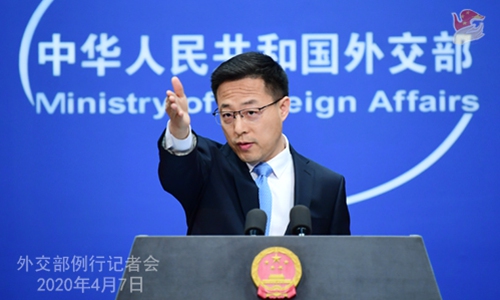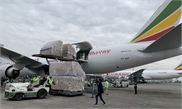
Foreign ministry spokesperson Zhao Lijian is making remarks at a press briefing on April 7. Photo: Ministry of Foreign Affairs
China's cooperation with Australia's southeastern Victoria state under the Belt and Road Initiative (BRI) is the result of friendly consultations, and the partnership is fair and legitimate, Zhao Lijian, spokesperson of China's Foreign Ministry, said on Monday.
The comments came after US Secretary of State Mike Pompeo and Australian Home Affairs Minister Peter Dutton warned of "potential risks" for Australia, as the two are vehemently opposed to Victoria's BRI partnership with China.
Pompeo even threatened that the US may choose to "disconnect from Australia", alleging American telecoms services may be compromised by Victoria state BRI cooperation with China.
Dutton described the BRI project as "a propaganda initiative from China" that brings an "enormous amount of foreign interference," according to local media reports.
Some Australian politicians' accusations criticizing Victoria's BRI partnership with China are untenable, which only expose their intentions to ignore the interests of the Australian people and damage China-Australia relations, Zhao noted.
The BRI is an economic cooperation initiative that advocates widespread consultation, joint project contribution and shared benefits, built on the principles of openness, inclusiveness and transparency, Zhao said, noting BRI has brought practical benefits to countries and regions joining the initiative.
And, the threats from US politicians are truly ridiculous, Zhao said. "Is there any connection between US telecommunications security and the Australian state government's cooperation with China under the BRI?" Zhao asked. "How is the US qualified to disrupt and discredit China-Australia cooperation?"
"Isn't it interference in the internal affairs of other countries?" Zhao said, adding that even the US ambassador to Australia has said Victoria's BRI partnership with China does not involve the US.
"Some Australian politicians often cite 'foreign intervention' and 'China coercion,' so why don't they object to such US behaviors?" questioned Zhao. "It speaks of some Australians' deep-rooted ideological bias and double standards," he said.



